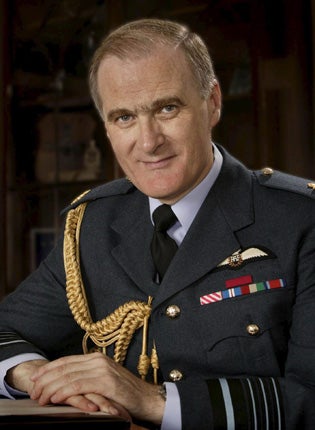Army top brass axed as Cameron prepares for challenging times

The British military will have a new chief, with the current holder of the post being asked to retire early, as it faces one of the most challenging periods in its history.
Air Chief Marshal Sir Jock Stirrup will be stepping down in the autumn, six months before the end of his term. At the same time, the most senior civil servant at the Ministry of Defence, Sir Bill Jeffrey, will also be leaving.
David Cameron has indicated that he wants a clean sweep at the top with a new leadership in place at a critical time in the Afghan war and the armed forces coping with major cuts in the defence budget.
Air Chief Marshal Stirrup was asked by the previous government to extend his tenure as Chief of Defence Staff in a move seen as blocking General Sir Richard Dannatt, the then head of the Army, from getting the job.
General Dannatt's relations with Gordon Brown and his ministers had become increasingly fractious due to his repeated charges that the armed forces were not being adequately funded, especially in regard to equipment in the Afghan war.
Following his retirement, General Dannatt became a Conservative defence advisor at the request of Mr Cameron and there was a view among some in the party that both Sir Jock and the Permanent Under Secretary Sir Bill Jeffrey were too close to the Labour government.
However, a senior defence source said yesterday: "They both worked under the long years of the last Labour government and so became associated with it. But Jock had to cope with Gordon Brown, who was a bit of a nightmare and had little understanding of what was needed to fight a war."
Air Chief Marshal Stirrup and Sir Bill had also faced criticism of the way the procurement budget for equipment had been spent. But yesterday Foreign Secretary William Hague said: "When you look at the extent of the procurement entered into by the MoD, far beyond the budget that was meant to be available, one might conclude that it has not been run as well as it might have been.
"But I place the responsibility for that... on the previous government, not on the people working for the MoD."
Air Chief Marshal Stirrup and Sir Bill will both leave after the completion of the Strategic Defence Review (SDR) which will decide on the future shape and direction of the armed forces.
Their successors are expected to be announced within two weeks. The front runners for military chief are General Sir David Richards, the head of the Army, General Sir Nick Houghton, who as vice-chief of defence staff was Sir Jock's deputy, and Admiral Sir Mark Stanhope, the head of the Royal Navy.
Gen Richards is regarded as the favourite. He is the most high profile of the candidates and became the first foreigner to command US forces since the Second World War when he led Nato forces in Afghanistan four years ago. He has built a close relationship with General David Petraeus, the American commander in charge of the Afghan and Iraqi missions.
If Gen Richards becomes Chief of Defence Staff, he is likely to be succeeded by General Sir Peter Wall, currently commander-in-chief Land who is experienced in the Afghan and Iraq conflicts.
Senior defence sources said yesterday that it was imperative that Sir Jock's replacement should be chosen early so he has a chance to play a suitable part in the SDR rather than inherit one.
The Defence Secretary, Liam Fox, said yesterday: "Both the chief of defence staff and PUS are here longer than they needed to be. They were asked to stay on to see the transition into the new government."
In the frame for the top post
General Sir David Richards, Chief of General Staff
Gen Richards, the highly influential head of the Army, is the favourite to become the Chief of Defence Staff. Indeed, it is widely believed in Whitehall that the tenure of Sir Jock Stirrup was extended not only to keep the outspoken General Sir Richard Dannatt from the job but also to prepare the way for Sir David.
Not all Gen Richards' actions in the past had been to the establishment's liking. He, for instance, effectively ignored orders in Sierra Leone to evacuate British nationals and leave, instead staying on to fight off rebel forces.
Sir David was the first foreigner, since the Second World War, to command US forces when he headed the Nato mission to Afghanistan in 2006.
General Sir Nick Houghton, Vice-chief of defence staff
General Houghton has been involved in planning the operations of the British military at the highest level during the conflicts in Iraq and Afghanistan. He has served in Northern Ireland and was the deputy-commander of collation forces in Iraq at some of the most violent stages of the insurgency. Gen Houghton is currently deputy to Sir Jock Stirrup, a post he has held for just over a year.
Admiral Sir Mark Stanhope, The First Sea Lord
Sir Mark took over as the head of the Royal Navy at a difficult time following the controversy over the capture of personnel in the Gulf by the Iranians. However, since then he has made a strong case for the Navy in the fight for resources among the three services and may have secured the building of two new aircraft carriers.
The Royal Navy's position is believed to have been strengthened by the fact that the new Defence Secretary, Liam Fox, is likely to back the carrier project.
Join our commenting forum
Join thought-provoking conversations, follow other Independent readers and see their replies
Comments